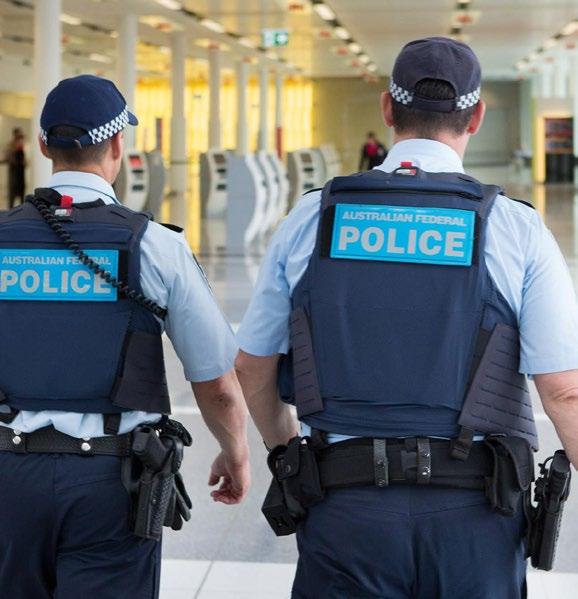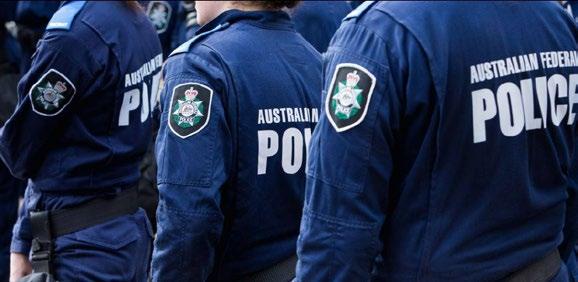
Federal
Association



Federal
Association

The 2025 federal election in Australia marks a critical juncture in the nation’s political and social landscape. As the election approaches, it brings into focus significant issues, including national security, immigration policy, climate change, economic recovery, and social equity.
The outcomes of this election will profoundly influence Australia’s future, shaping the policies and priorities of the government in addressing these pressing challenges. Political parties are already ramping up their campaigns, striving to capture the attention and trust of voters who are preparing to make vital decisions about the country’s governance. Against this backdrop, the Australian Federal Police Association (AFPA) is advocating for a transformative agenda that addresses the systemic challenges faced by the Australian Federal Police (AFP). The AFPA is committed to ensuring that the AFP, as a cornerstone of Australia’s security framework, is equipped to meet the demands of modern law enforcement. This commitment involves not only enhancing the resources and operational capabilities of the AFP but also ensuring that its members—police officers, protective service officers, and unsworn appointees— receive the recognition, support, and remuneration they deserve.
The AFPA has outlined four key pillars that form the foundation of its advocacy during the 2025 election campaign:
The AFPA seeks to restore integrity and fairness to the enterprise agreement bargaining process. This involves ensuring that the government engages in genuine negotiations and delivers outcomes that respect the contributions of AFP members, particularly in terms of fair wages and working conditions.
A significant focus is on addressing the mental and physical toll that AFP roles impose on its most important asset: its people. The AFPA calls for greater support systems, including enhanced access to mental health resources and initiatives to combat the long-term impacts of servicerelated trauma.
The AFPA emphasises the need for robust ethical standards and practices within the AFP, ensuring that its operations and personnel maintain the highest levels of professionalism and public trust.
Central to the AFPA’s agenda is re-establishing the AFP as a leading law enforcement body in Australia, with resources, capabilities, and compensation that reflect its critical role in safeguarding national security and protecting Australia and its many communities.
The government’s refusal to raise the wages of AFP police officers to a level comparable with other policing services across Australia has entrenched the AFP as the lowest base paid police service in the country, and this must change in the future.
This outcome has demoralised AFP appointees and highlighted the government’s lack of understanding or appreciation for the vital work performed by the AFP.
The ongoing underfunding and lack of support have compounded the challenges faced by AFP appointees, who are consistently asked to do more with fewer resources. This strain has significantly affected their mental and physical well-being and ability to operate effectively in their roles.
Despite many challenges, the AFPA has delivered significant outcomes in recent years, demonstrating its commitment to advancing the interests of AFP members.
Despite many challenges, the AFPA has delivered significant outcomes in recent years, demonstrating its commitment to advancing the interests of AFP members. Notable achievements include:
• National Firearms Register: Facilitating a centralised database to enhance firearm control and public safety.
• Presumptive PTSD Legislation: Securing recognition of post-traumatic stress disorder as a workplace-related condition, ensuring affected personnel receive adequate support.
• Critical Illness Leave Registry: Providing AFP appointees with the possibility of additional leave if they are diagnosed with a terminal illness and have exhausted their personal leave provisions.
• Additional funding for Enterprise Agreement wage increase: AFP appointees’ industrial action, led by the AFPA, resulted in an additional $40 million in the funding envelope, which saw allowances increased and introduced to the benefit of AFP appointees.
• Retention of Protective Service Officers: Preserving the presence of these officers at critical national security sites such as Exmouth and Geraldton.
Looking ahead, the AFPA aims to build on these successes by advocating for policies that strengthen the AFP and its ability to combat crime effectively. To this end, the AFPA is calling on all political candidates to clearly articulate their positions and commitments regarding the key issues outlined in its campaign. The AFPA will then share this information with its 4,300 members, their families, and the wider community, ensuring that voters are well-informed about each party’s stance on matters affecting the AFP.
For too long, AFP appointees have been expected to shoulder increasing responsibilities without corresponding support or resources. The AFPA calls on all parties’ candidates to take decisive action to address these inequities. Restoring the AFP to its rightful place as Australia’s premier law enforcement agency requires a commitment to fair wages, improved resources, and greater recognition of the challenges faced by its members.
This is not just a matter of supporting a vital institution—it is about protecting those who protect Australia. Every day, AFP officers work tirelessly to ensure the safety and security of the nation. It is time for the government to match their dedication with meaningful action.
The AFPA urges all candidates to prioritise the welfare and operational effectiveness of the AFP. By addressing the issues outlined in this campaign, candidates can help secure a safer, stronger Australia for generations to come. The AFPA stands ready to work with all politicians committed to supporting the men and women who dedicate their lives to protecting the nation.
The AFPA’s vision for 2025 is achievable. By addressing the pressing issues of workplace fairness, mental health, organisational integrity, and operational excellence, we can ensure the AFP continues to serve as Australia’s premier law enforcement agency. Together, we will advocate for meaningful change to support our members and safeguard Australia’s future.

Alex Caruana President
VISION
Remove the AFP from the constraints of the Public Sector Workplace Relations Policy 2023.
OBJECTIVE
• Enable independent and flexible enterprise agreements tailored to the unique needs of the AFP.
• Introduction of a tribunal system that can adjudicate on points without being referred to the Fair Work Commission for hearing.
VISION
Enhance support mechanisms for AFP appointees facing psychological and physical challenges.
OBJECTIVE
• Introduce mandatory sentencing for offenders convicted of harming a Commonwealth public official as per Division 147 of the Criminal Code 1995.
• Amend the Safety, Rehabilitation and Compensation Act 1988 to remove punitive reductions in incapacity payments.
• Introduce the AFP Blue Card, akin to the Department of Veterans Affairs White Card.
• Establish a National Commissioner for First Responder Mental Health and Suicide.
• Ensure no member is financially disadvantaged due to rehabilitation costs.
• Explore the establishment of Police Treatment Centres.
VISION
Foster accountability and fairness in the AFP’s professional standards and employment decisions.
OBJECTIVE
• Conduct a comprehensive review of the AFP’s Professional Standards framework.
• Establish a Review Panel for employment decisions under the AFP Regulations 2018.
• Expand the jurisdiction of the Merit Protection Commissioner.
• Clarify definitions of “corruption” and “serious misconduct” within the AFP Act 1979
Return the AFP to Australia’s Premier Law Enforcement Agency
VISION
Empower the AFP to meet growing national and international demands with excellence.
OBJECTIVE
• Increase AFP personnel to a baseline of 10,000 appointees by 2028.
• Ensure a sworn officer ratio of at least 60% of the total workforce.
• Secure appropriate funding and remove efficiency dividends.
• Conduct an independent, comprehensive, and broad-ranging capability review of the AFP incorporating insights from previous reviews such as the Fuller and Lawler Reviews.
• Conduct an independent review of the AFP’s Executive structure.

The AFP operates in a unique and high-pressure environment, distinct from the broader public service. Its workforce requires policies and agreements that reflect these differences, enabling flexibility, operational readiness, and alignment with contemporary law enforcement practices. Maintaining the current policy—or reverting to an even stricter one—risks perpetuating inefficiencies and dissatisfaction among AFP appointees, ultimately compromising the organisation’s ability to fulfill its critical mission effectively.
By securing independence from the Federal Government’s Public Sector Workplace Relations Policy, the AFP would be empowered to craft employment agreements that truly reflect its operational context, fostering a more resilient and capable workforce.
The existing policy framework has significantly undermined the bargaining process. While the current Australian Labor Party (ALP) government may have shown greater flexibility compared to the previous Liberal-National Party (LNP) government, the policy still limits the necessary opportunities and flexibilities essential for managing a complex and unique organisation like the AFP.
Despite this ongoing erosion, insufficient efforts have been made to ensure that enterprise agreements are contemporary and aligned with the AFP’s specific employment practices. Both major political parties continue to view and treat the AFP workforce through the lens of a traditional public service department, applying a generic approach that fails to account for the distinct operational and organisational demands of law enforcement and the AFP.
By removing the AFP from the policy, the organisation, AFPA, and independent negotiators would gain the autonomy to engage in sensible and unconstrained bargaining. This would enable the development of an enterprise agreement specifically tailored to the needs of a modern law enforcement organisation. Such an agreement would reflect the AFP’s unique challenges and operational realities, fostering a more adaptive and fit-for-purpose employment framework.
Under a ALP government, the existing policy would remain unchanged, perpetuating the treatment of the AFP and its workforce as if they were a traditional public service department. This approach would lock the AFP into the restrictive and unsatisfactory “whole of government” bargaining processes, resulting in enterprise agreements that fail to address the specific needs of the AFP.
Under an LNP government, there is the added risk of reverting to their previous workplace relations policy. This earlier framework was even more restrictive and draconian than the current ALP policy. If reimplemented, it could severely constrain negotiations for the 2027–2030 AFP Enterprise Agreement, further undermining the AFP’s operational effectiveness and workforce morale.
As a result, the AFPA requests that any future government remove the AFP from the Public Sector Workplace Relations Policy and allow the organisation, AFPA and independent bargainers to engage in sensible and unconstrained bargaining.
The idea of an AFP Arbitral Tribunal (AFPAT) would follow the success of the Northern Territory Police Arbitral Tribunal (NTPAT), a specialised body established to address industrial disputes and employment-related matters within the Northern Territory Police Force.
Its primary role is to provide a fair and efficient forum for resolving conflicts between the organisation and its members, particularly in relation to employment conditions, wages, and workplace disputes.
The NTPAT was established under the Police Administration Act 1978 and functions independently to ensure impartiality in its decision-making. It is envisaged that changes would have to occur to the Australian Federal Police Act 1979 and would operate within a framework that upholds both the operational needs of the organisation and the rights and welfare of its members.
The tribunal would also play a crucial role in maintaining harmonious labour relations and ensuring that the unique working conditions of AFP appointees are adequately addressed.
Dispute identified and raised by AFPA to AFP
Dispute identified and raised by AFPA to AFP
Dispute resolution attempted between AFPA and AFP
Resolution unsuccessful
Dispute referred to Fair Work Commission or Federal Court for adjudication
Dispute resolution attempted between AFPA and AFP
Resolution unsuccessful
Matter heard in Fair Work of Federal Court
Dispute referred to Police Arbitral Tribunal for adjudication
Parties unsatisfied with adjudication refer dispute to Fair Work Commission or Federal Court
While the introduction of a AFPAT would seem to be an additional element to the current process, the AFPA believes that this introduction would reduce costs and be timelier when dealing with disputes that require an independent arbiter.
The AFPA is advocating for the introduction of mandatory sentencing for individuals convicted of harming Commonwealth public officers under Division 147 of the Criminal Code 1995. Currently, the maximum penalty for this offence is 13 years imprisonment. However, sentencing practices across Australia have created an environment where maximum penalties are seldom applied, undermining the deterrent effect of these provisions. To address this issue, the AFPA is calling for legislative amendments to ensure a minimum mandatory sentence for offenders convicted of assaulting Commonwealth public officials. Such a measure would establish a true deterrent and enhance the safety of those serving the public in these critical roles. The AFPA urges future governments to amend Division 147 of the Criminal Code 1995 accordingly.
The AFPA seeks to eliminate the 45-week stepdown provision under the Safety, Rehabilitation and Compensation Act 1988 (SRC Act), which reduces incapacity payments by 25 percent for injured AFP appointees after 45 weeks. This reduction applies irrespective of whether the injury is physical or psychological.
Evidence suggests that this punitive measure forces some AFP appointees to return to work prematurely, risking further harm, as they feel financially compelled rather than medically ready. The AFPA advocates for a future government to amend the SRC Act to remove the 25 percent reduction in incapacity payments after 45 weeks for AFP appointees with psychological injuries and establish an appeal process for decisions related to incapacity payment reductions under the Act.

Since 2019, the AFPA has championed the introduction of an ‘AFP Blue Card’ for current, future, and former operational AFP appointees. This initiative, modelled on the Department of Veterans Affairs ‘White Card,’ aims to provide government-funded psychological and medical treatment to AFP appointees.
Proposed Benefits of the AFP Blue Card:
• Psychological treatment
• Hospital and day procedure facility treatment
• Services by allied health professionals, GPs, specialists, dental and optical professionals
• Subsidised medicines at concession rates
• Community nursing, pathology, and medical imaging
• Counselling, home help, aids, appliances, and modifications
• Travel assistance for medical appointments
• Comprehensive care services
There is nothing more important than the mental health and wellbeing of the people who serve and project our communities every day.
— Ken Lay, Chair of the Police Emergency Services Study Group (2023)
The AFPA urges future governments to commit to implementing the AFP Blue Card for all AFP appointees who have worked in operational capacities.
Recovering AFP appointees face financial burdens due to the disparity between Comcare’s use of the Australian Medical Association (AMA) fee list and the actual costs of medical services. This gap forces injured personnel to cover out-of-pocket expenses, compounding their financial stress.
For example, an AFP appointee incurred $1,616.86 in out-of-pocket expenses despite having an approved Comcare claim. Research by the AFPA revealed that the cost of initial physiotherapy consultations in the ACT is, on average, 31.5 percent higher than the AMA fee list’s upper limit.
To ensure no AFP appointee is financially disadvantaged due to rehabilitation costs for workplace injuries the AFPA urges the government to revise compensation mechanisms to fully cover treatment costs.
First responder mental health and suicide are critical issues that demand urgent attention. Recent statistics show that a first responder takes their own life every six weeks, with six AFP serving members committing suicide in recent years. However, data on suicide among former and retired officers is sadly lacking.
The AFPA proposes the establishment of a National Commissioner for First Responder Mental Health and Suicide, modelled on the National Commissioner for Defence and Veteran Suicide (NCDVS). Alternatively, the remit of the NCDVS could be expanded to include first responders. This role would investigate deaths by suicide among first responders and develop national strategies to address mental health and suicide prevention in the first responder environment.
The AFPA advocates for the introduction of Police Treatment Centres (PTCs) in Australia, modelled on successful examples in Canada and England. These centres provide residential physiotherapy and psychological support for serving and retired police officers recovering from injuries, illnesses, or health conditions.
Key Features of PTCs:
• State-of-the-art facilities with multidisciplinary teams, including physiotherapists, fitness instructors, nurses, and counsellors
• Specialised programs for women’s health and job-related fitness tests
• Online support and resources
The AFPA is asking for a future government, in partnership with state and territory governments to commit to conducting a scoping study to explore the feasibility of establishing PTCs in Australia to enhance the health and well-being of the policing workforce.

The Australian Federal Police Association (AFPA) strongly advocates for a comprehensive and independent review of the Australian Federal Police’s (AFP) Professional Standards framework, encompassing its legislation, policies, and work practices. This review should prioritise the well-being of AFP appointees involved in professional standards investigations, ensuring a fair and supportive environment throughout the process.
Under the existing framework, AFP appointees often experience ostracism, exclusion, and a denial of natural justice during investigations. While a robust professional standards regime is essential, it should not come at the expense of the mental health and well-being of its appointees. Appointees report feeling vulnerable, unsupported, and disillusioned, facing limited access to support mechanisms and a pervasive fear of retribution.
1. Suspension and Secondary Employment Decisions
Appointees have raised significant concerns about the decision-making processes surrounding suspensions and restrictions on secondary employment. These decisions have far-reaching consequences, not only for the appointees but also for their families, highlighting the urgent need for a transparent and accountable system.
2. Timeliness of Investigations
Professional standards investigations often exceed reasonable timeframes, causing prolonged stress and uncertainty for those involved. Currently, the benchmark for resolving category three investigations is 256 days, yet the average duration in 2024 was 293 days. Corruptionrelated (category four) investigations lack a benchmark altogether and averaged 454 days in 2024. Such delays would be unacceptable in other judicial or administrative contexts and undermine trust in the process.
3. Human Rights Concerns
The review must assess whether any breaches of human rights have occurred during investigations. There is widespread agreement that if AFP appointees treated members of the public or suspects similarly, they would face criticism and formal investigation.
AFP appointees operate under unique employment conditions that curtail freedoms and rights enjoyed by most Australian employees. For instance, Section 40K allows the Commissioner to declare “serious misconduct,” precluding employees from accessing remedies under the Fair Work Act 2009. An example is Section 69B which limits the application of the Fair Work Act 2009 in certain decisions, creating a

disparity with Australian Public Service (APS) employees. These constraints necessitate additional safeguards and oversight to ensure fairness and transparency in employment and disciplinary matters.
1. Amendments to the Australian Federal Police Act 1979
• Clarify Definitions of “Serious Misconduct” and “Corruption”
Section 40K of the Act defines “serious misconduct” in a way that predates the introduction of Part V, causing confusion during investigations of Category 3 conduct. A clearer, contemporary definition aligned with operational realities is essential.
Similarly, the broad interpretation of “corruption” disadvantages AFP appointees compared to state and territory police officers. Instances such as accepting unsolicited discounts or benefits, like free public transport (offered by some states to police officers), should not be construed as corruption unless explicitly solicited or misused.
• Address Unchecked Disciplinary Powers
The Commissioner’s authority to reduce an employee’s salary without recourse must be re-evaluated. Such measures may lead to excessive salary reductions without adequate safeguards for affected employees.
2. Strengthening Oversight and Review Mechanisms
• Establish a Review Panel
Under Regulation 61 of the Australian Federal Police Regulations 2018, a review panel should be established to examine employment decisions on their merits. This would include decisions regarding roles, transfers, promotions, and recruitment.
• Extend Jurisdiction of the Merit Protection Commissioner
Unlike Australian Public Service (APS) employees, AFP appointees lack access to the Merit Protection Commissioner for review of workplace and promotion decisions. Expanding the Commissioner’s jurisdiction to cover all AFP appointees would introduce parity and strengthen accountability.
3. Review of Professional Standards Framework
Since its inception in 2006, the current Professional Standards framework remains largely unchanged.
The AFPA recommends the Federal Government commission a review through the Legal and Constitutional Legislation Committee to examine Part V of the AFP Act 1979. This review should ensure the framework aligns with modern practices, eliminates punitive measures outside statutory oversight, and harmonises with the National Anti-Corruption Commission to prevent duplication or oversight gaps.
The AFPA urges a future Federal Government to:
• Commission an independent review of the AFP Professional Standards framework.
• Amend the Australian Federal Police Act 1979 to clarify definitions of “serious misconduct” and “corruption.”
• Strengthen oversight mechanisms by extending the Merit Protection Commissioner’s jurisdiction and establishing a review panel under Regulation 61. These measures are critical to fostering a professional standards regime that upholds integrity while safeguarding the well-being, rights, and dignity of AFP appointees.

Expanding the Australian Federal Police to 10,000 members is crucial for enhancing Australia’s ability to address contemporary law enforcement challenges. Prioritising recruitment, retention, training, operational modernisation, and strategic evaluation will enable the AFP to strengthen its capacity to safeguard the nation effectively. A thorough Capability Review will further support these efforts, ensuring the AFP’s continued growth and preparedness to meet future demands, reinforcing its status as a world-class law enforcement agency.
This ambitious yet necessary goal reflects the increasing demands of both national and international law enforcement, as well as national security. Achieving it will require a holistic approach, including strategies for recruitment, retention, training, resource allocation, and operational enhancements.
The AFP’s “Blue Paper To 2030 and Beyond” emphasises the need to adapt to emerging challenges, including cybercrime, terrorism, and transnational organised crime.
By expanding its capabilities, the AFP can effectively respond to these complex threats and safeguard Australia’s national interests.
With crime increasingly transcending borders, the AFP’s international presence is vital. The establishment of liaison offices, such as the one in Paris, demonstrates the AFP’s commitment to collaborating with global partners to combat transnational crime.
Expanding the AFP enables more robust international partnerships and information sharing.
Australia’s investment in regional policing initiatives, like the AU$400 million plan to enhance police training and create a mobile regional police unit in the Pacific Islands, underscores the AFP’s role in promoting stability and security in neighbouring regions.
An expanded AFP can provide essential support to these initiatives, addressing issues such as drug trafficking, human trafficking and child exploitation. Recent incidents, including the arson attack on the Adass Israel Synagogue in Melbourne, highlight the rise of domestic extremism and hate crimes.
The AFP’s launch of Special Operation Avalite to tackle antisemitism demonstrates the need for expanded resources to effectively address and prevent such threats.
on developing managers and leaders within the organisation will improve the wellbeing of all members!
Reports of police shortages, particularly in New South Wales, where approximately 4,000 vacancies exist, indicate a strain on law enforcement resources.
Expanding the AFP can alleviate some of this pressure by providing additional personnel and support to ensure community safety.
In summary, expanding the AFP is essential to effectively address evolving security challenges, enhance international and regional cooperation, combat domestic extremism, and mitigate resource constraints within Australia’s law enforcement agencies.
Attracting new members to the AFP necessitates innovative and targeted recruitment efforts to ensure a diverse, skilled, and motivated workforce:
• Nationwide Campaigns: Launch comprehensive awareness campaigns to highlight the AFP’s pivotal role in safeguarding national security and public safety. These campaigns should leverage traditional and digital media to reach a broad audience.
• Diverse Recruitment Pools: Actively recruit individuals from underrepresented groups, including women, Indigenous Australians, and culturally and linguistically diverse communities, to reflect the diversity of Australian society.
• Youth Engagement: Collaborate with schools, universities, and community organisations to introduce young Australians to careers in law enforcement, showcasing the opportunities and impact of joining the AFP.
• Incentive Programs: Offer competitive salaries, relocation assistance, housing allowances, and other benefits to attract top talent from across the country.
Maintaining a highly skilled workforce is critical to the AFP’s effectiveness and capacity for growth. Key initiatives include:
• Enhanced Training Programs: Develop and implement comprehensive training modules focused on emerging challenges such as cybercrime, terrorism, organised crime, and human trafficking.
• Leadership Development: Establish robust leadership programs to prepare officers for senior roles, ensuring a strong leadership pipeline within the organisation.
• Continuous Education: Provide opportunities for ongoing education, specialisation, and professional development to keep members at the forefront of evolving law enforcement practices.
• Mentorship Initiatives: Pair new recruits with experienced officers to promote knowledge sharing, skill development, and professional growth.
Retaining skilled officers is as critical as recruiting new ones. The AFP can enhance retention by:
• Work-Life Balance: Introduce flexible working arrangements, comprehensive mental health support programs, and wellness initiatives to address the unique challenges of law enforcement careers.
• Career Progression: Offer clear and transparent pathways for career advancement, enabling members to envision a long-term future within the AFP.
• Recognition and Rewards: Implement performancebased recognition programs to celebrate exceptional service and dedication.
• Engagement Surveys: Conduct regular feedback surveys to identify areas for improvement and address member concerns promptly.
Modernisation efforts will enhance operational efficiency and appeal to tech-savvy recruits:
• Advanced Tools: Equip officers with cutting-edge technologies such as AI-driven analytics, mobile applications, and enhanced communication systems to streamline operations and improve decision-making.
• Online Recruitment Portals: Develop user-friendly online platforms for job applications, career resources, and virtual job fairs.
• Cybercrime Units: Expand specialised units dedicated to tackling the growing prevalence of digital crimes, reinforcing the AFP’s leadership in this critical area.
Building trust and collaboration with the community is vital for recruitment success and operational effectiveness:
• Community Policing: Strengthen programs that foster positive relationships between officers and the communities they serve.
• Outreach Programs: Organise workshops, seminars, and public events to educate Australians about the AFP’s role and the benefits of a career in law enforcement.
• Youth Programs: Support initiatives that inspire young Australians to consider careers in the AFP, such as internships, cadetships, and mentorship opportunities.
Achieving the goal of 10,000 appointees requires robust resource allocation and long-term strategic planning:
• Increased Budgets: Advocate for enhanced funding to support recruitment, training, and operational requirements.
• Policy Alignment: Collaborate with policymakers to align national security objectives with the AFP’s growth goals.
• Strategic Planning: Develop a forward-looking strategy that balances immediate operational needs with sustainable growth initiatives.

The AFP’s growth strategy would benefit from an independent, comprehensive and broad-ranging Capability Review. This review would:
• Assess Strengths and Gaps: Evaluate the AFP’s current capabilities and readiness to meet medium-term critical needs.
• Incorporate Stakeholder Feedback: Include input from internal and external stakeholders such as AFP appointees, government agencies, non-government organisations, and industry representatives.
• Conduct Site Visits: Gain insights into frontline services and operations through visits beyond Canberra.
• Analyse Surveys: Review recent AFP Staff Surveys and AFPA Member Surveys to identify trends and areas for improvement.
The AFPA is asking for a future government to commit to the AFP and its hardworking workforce and support its growth and expansion.
By expanding the AFP to 10,000 appointees, with a 60/40 ratio of sworn to unsworn appointees, and increasing the AFP’s detective headcount is crucial for enhancing Australia’s ability to address contemporary law enforcement challenges and protect Australia and its many communities.
Retention and recruitment of AFP appointees should be at the forefront of any future government and we are asking the future Government to commit to these processes. We have seen past governments commit to the Australian Defence Force in relation to recruitment and retention, and we believe that same commitment should be applied to the AFP and its workforce.
In a world marked by rapid globalisation, technological evolution, and complex threats, the role of law enforcement has become more critical than ever. The Australian Federal Police (AFP) stands as a pillar of security, justice, and public confidence, safeguarding Australia from threats that transcend borders, undermine democracy, and jeopardise our way of life.
The AFP operates at the intersection of local and global challenges, addressing crime and security concerns that extend beyond the scope of state and territory police forces. Its unique mandate includes countering terrorism, cybercrime, human trafficking, drug smuggling, and transnational organised crime. In an interconnected world, where a cyberattack from one continent can cripple another’s infrastructure, the AFP’s expertise ensures that Australia is protected from these global threats.
The AFP embodies the principles of fairness, transparency, and accountability that underpin Australia’s democracy. By enforcing federal laws, the AFP not only upholds the rule of law but also ensures that individuals, corporations, and even governments are held accountable for their actions. Its presence strengthens public trust in Australia’s legal system, demonstrating that no one is above the law.
The AFP’s ability to adapt to emerging threats is a testament to its necessity:
• Counterterrorism: As extremist ideologies and terrorism evolve, the AFP works tirelessly to prevent attacks, disrupt networks, and ensure the safety of Australians both at home and abroad.
• Cybercrime: In an era where data breaches, ransomware, and online fraud are on the rise, the AFP protects Australia’s digital infrastructure and safeguards citizens’ personal information.
• Transnational Crime: With operations spanning continents, the AFP collaborates with international agencies to dismantle criminal syndicates involved in drug trafficking, human smuggling, and financial crimes.
Australia’s security is intrinsically linked to the stability of the Indo-Pacific region and the broader global community. Through partnerships with Interpol, the United Nations, and regional law enforcement agencies, the AFP contributes to peacekeeping, disaster response, and capacitybuilding initiatives. This not only strengthens Australia’s diplomatic ties but also fosters regional security.
The AFP plays a vital role in addressing crimes that disproportionately affect vulnerable populations, such as child exploitation, domestic violence, and human trafficking. By prioritising victim-centered approaches, the AFP ensures that justice serves those who need it most, reinforcing Australia’s commitment to human rights and social equity.
The Australian Federal Police and its most valuable asset, its people, is not just a law enforcement agency; it is a cornerstone of Australia’s national integrity, security, and resilience. Its unwavering commitment to justice, its adaptability to emerging challenges, and its dedication to protecting Australians at home and abroad make it an indispensable institution.
In a world where security cannot be taken for granted, the AFP serves as a reminder that the safety of a nation depends on the strength, integrity, and vigilance of those sworn to protect it. As Australians, we must continue to support and invest in the AFP, recognising its role in shaping a safer, fairer, and more secure future for all.